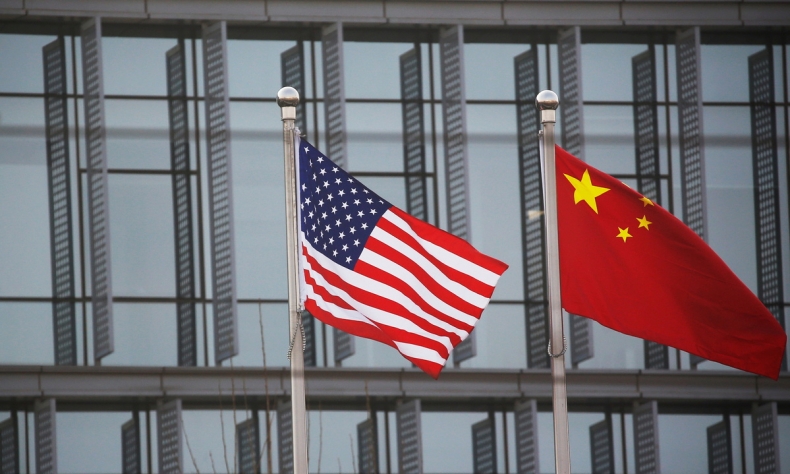The Big Stick Theory

The U.S. cannot pretend to communicate while harming China’s core interests and concerns; it cannot claim to keep a crisis under control while continuing to flex the muscle in front of China.
“Speak softly and carry a big stick—you will go far.” The 26th president of the U.S., Theodore Roosevelt, often used this saying to describe his foreign policy tactics. Described by him in 1900 as a West African proverb, the idea is to negotiate peacefully but simultaneously maintain the threat of the military power. Nearly 120 years later, one can easily see how the U.S. is still pursuing this kind of “big stick ideology” in Sino-U.S. relations.
Throughout May, against the backdrop of slightly thawing Sino-U.S. relations and the gradual resumption of high-level dialogues, the U.S. repeatedly expressed its “desire” to hold a meeting between the defense ministers of the two countries during Asia’s premier security summit, the Shangri-La Dialogue, which took place in Singapore from June 2 to 4.
One of the important reasons China rejected the U.S. proposal was that the U.S. continues to refuse to lift its unilateral sanctions on Chinese State Councilor and Minister of National Defense Li Shangfu. The U.S. imposed the sanctions in accordance with the Countering America’s Adversaries Through Sanctions Act in 2018, as Li then presided over China’s purchase of combat aircraft and equipment from Russia’s main arms exporter, Rosoboronexport. Before the Shangri-La Dialogue’s opening dinner, Li and U.S. Secretary of Defense Lloyd Austin had a friendly handshake, but this did not satisfy the U.S. side. “A cordial handshake over dinner is no substitute for substantive engagement,” Austin complained during the speech he delivered to the dialogue the following day.
In addition to being unable to accept the U.S. sanctions on China’s defense minister, recent U.S. military provocations around China have also been a cause for grave concern. On May 26, during routine training exercises by the Chinese Navy in the South China Sea, a U.S. RC-135 reconnaissance plane broke into the training area and was driven away by Chinese fighter jets; on June 3, a U.S. guided-missile destroyer and a Canadian frigate sailed through the Taiwan Straits. The two countries claim that the “freedom of the high seas and navigation rights” apply to the Straits, but this unusual voyage was in effect a provocation of the one-China principle as well as a violation of the U.S. promise not to support “Taiwan independence.”

While blaming China’s “arrogance” in rejecting the meeting proposal, Austin devoted a great deal of his speech at the Shangri-La Dialogue to introducing the security layout of the U.S. in the Asia-Pacific region. He revealed the U.S. has persuaded the Philippines to open four new military bases, will forward-station the 12th Marine Littoral Regiment, the most advanced formation in the U.S. Marine Corps, in Japan by 2025 to deepen stability in the “first island chain,” and will also strengthen military cooperation and joint military exercises with Australia and the Republic of Korea. Obviously, these military forces have only one imaginary rival: China.
In recent years, Sino-U.S. relations have been at a low ebb and proven difficult to improve. For the U.S., as the greatest power on the planet, requesting communication, even in condescending manner, represents a kind of sincerity. But countries that pursue independent foreign policy, such as China, consider this “big stick diplomacy” performance a form of hegemonic diplomatic coercion. “On the one hand, the U.S. has paid lip service to enhancing communication, while on the other, it has been intentionally creating obstacles regardless of China’s concerns,” Senior Colonel Tan Kefei, spokesperson for China’s Ministry of National Defense, remarked during a press conference on May 31. “This is not the proper attitude toward communication.”
The U.S. cannot pretend to communicate while harming China’s core interests and concerns; it cannot claim to keep a crisis under control while continuing to flex the muscle in front of China. Perhaps the U.S. should listen to what Cui Tiankai, a retired veteran Chinese diplomat and former ambassador to the U.S., said in an interview with Reuters on June 4. “Why are they coming all the way across the ocean? To our doorstep? They’re getting too close to our territories, to our territorial waters—before anything else.” If high-level defense talks between the two countries are to resume, the U.S. should demonstrate “good faith” through actions, not just words, and halt its military deployments close to China.
 Facebook
Facebook
 Twitter
Twitter
 Linkedin
Linkedin
 Google +
Google +










